
What is a Project Analyst? Essential Skills, Core Duties, and Their Role in Project Success
Project success is a balancing act!
With so many moving parts to coordinate, project managers sometimes find it challenging to oversee every detail. And, in order to keep all these pieces working in sync and running smoothly, they feel in need of dedicated analytical support.
Well, that’s where Project Analysts step in!
However, to understand the real impact of project analysts, we’ve to look beyond basic job descriptions.
And that’s exactly what we’ll do in this blog!
Let’s dive in.
What is a Project Analyst?
A project analyst is a professional who supports organizations by analyzing, planning, and managing projects. In this role, they work closely with project managers, project teams, and project stakeholders to ensure every project stays:
- On time
- On budget
- Aligned with goals
So in practice, they are your project’s “eyes and ears,” bridging the gap between project planning and project execution.
At the same time, they also show exactly where things stand while highlighting risks or opportunities that could affect project success.
How Project Analysts Differ from Project Managers
Project analysts and project managers work closely together but have different responsibilities: project managers manage entire projects from start to finish, while project analysts focus on data analysis to guide decisions.
Here’s how these roles differ across key aspects-
| Aspect | Project Analyst | Project Manager |
| Core Focus | Data analysis & performance tracking | Overall project leadership & execution |
| Key Responsibilities | Monitor project KPIs, create reports, track progress, & flag risks | Plan projects, manage the project teams, allocate resources, & ensure delivery |
| Reporting Level | Leads the entire project team | Leads entire project team |
| Decision Authority | Provides insights to support decisions | Makes final project decisions |
| Work Type | “On-the-ground” information gathering and analysis | Strategic oversight and stakeholder management |
| Project Phase Focus | Throughout the project lifecycle, with detailed tracking | End-to-end project ownership |
Bonus info: Many successful project managers started as analysts first. This progression builds essential analytical skills and stakeholder communication experience before they step into project manager roles and manage the project team
Project Analyst Job Description: What Are the Key Duties of a Project Analyst?
Project analysts take on multiple responsibilities, including analyzing data, reporting progress, identifying risks, and coordinating across teams to ensure success.
Let’s see the breakdown of what a Project Analyst does:
Planning and execution support
The core responsibility of a Project Analyst is supporting the overall planning and execution of a project. Working under the project manager, they help define project goals, prepare timelines, and monitor schedules to keep progress consistent.
They also:
- Assist with resource allocation
- Review budgets and project scope documents
- Define key project deliverables and acceptance criteria
- Track project milestones against the deadlines
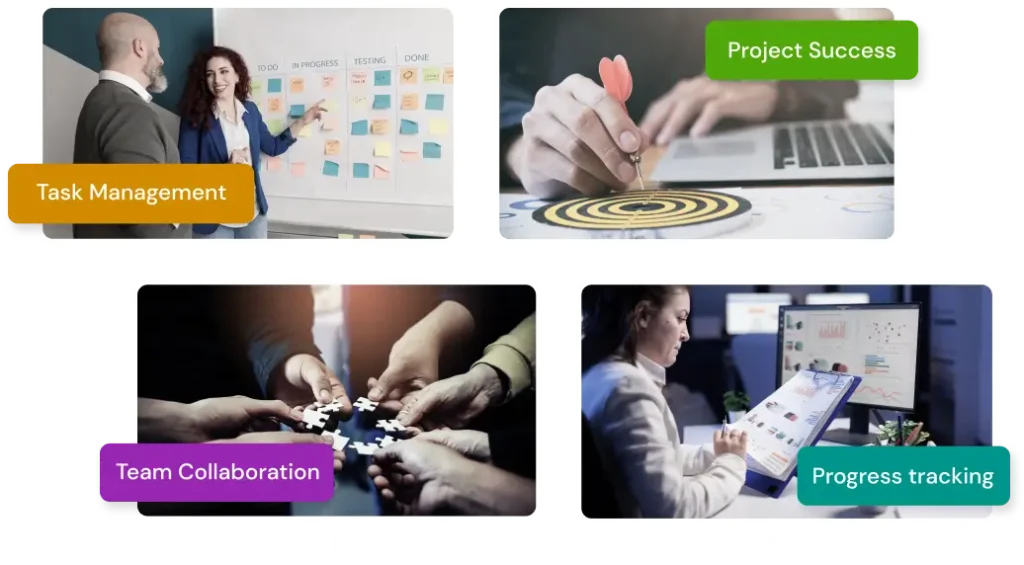
Step into the Future of Project Management!
Data analysis
Another primary duty of a project analyst involves analyzing project data to provide actionable insights. Here, analysts act as data detectives, tracking performance and progress reports to highlight risks and opportunities that affect the project.
But they don’t just collect numbers; they turn raw data into early warning signals that help teams stay ahead of delays or issues.
Besides, with the help of this analysis, managers compare performance against original plans and make timely adjustments when progress goes off track.
Documentation and reporting
Project analysts create comprehensive documentation to support all critical project elements.
This includes:
- Project schedules and budgets
- Status reports and meeting minutes
- Resource planning and tracking documents
- Stakeholder presentations
Beyond documentation, these records also serve as a reference point throughout the project and ensure accountability across teams.
Identify and mitigate risks
Project analysts are always looking around the corner for potential problems. They spot issues that could turn into major headaches and develop backup plans to keep things from going sideways.
This includes monitoring for scope creep by tracking project boundaries and ensuring new requests follow proper change control processes.
They also monitor risks closely and prepare practical responses to keep the project on track.
Quality assurance
Alongside risk management, project analysts make sure deliverables meet agreed quality standards. They review outputs against requirements, highlight gaps early, and confirm consistency before tasks move forward.
As a result, the project delivers not just on time and on budget, but also with the level of quality stakeholders expect.
Communicate with stakeholders
Project analysts are also responsible for maintaining clear communication between project teams and various stakeholders. This responsibility requires them to regularly interact with:
- Project sponsors
- Investors and company owners
- Senior management
- Customers and clients
- Government agencies
- Other internal teams
Analysts gather information from them, pass it to the team, and share project updates to keep everyone aligned.
Supporting the project manager and team
Another important duty of a project analyst is to provide direct support to project managers and team members. This support involves day-to-day coordination and monitoring daily tasks, along with responsibilities including:
- Review project workflows to spot inefficiencies
- Gather feedback from team members
- Recommend adjustments to improve efficiency
- Assist in resolving operational issues before they grow
For a complete look at how every role contributes, check out our guide on project team roles and responsibilities
What Skills and Qualifications Does a Project Analyst Must Have?
Project analysts balance data, people, and processes to keep projects on track. To manage this role effectively, they need technical expertise along with strong communication, problem-solving, and organizational abilities.
Below are the core skills and qualifications required for this role:
Project management skills
Project analysts need to understand project management principles so they can support projects effectively. This means having knowledge of:
- Planning methods
- Scheduling practices
- Risk management
- Execution steps
Plus, as part of these skills, analysts also prepare structured plans, allocate resources, and track progress through each stage of the lifecycle.
Bonus: Why Project Management is Important?
Data analysis skills
Analyzing data is central to this role, which is why project analysts need sharp analytical skills to evaluate project KPIs, budgets, and reports. Also, they must process and understand the data with accuracy to recognize patterns or risks early.
With solid analysis, project analysts spot trends, turn numbers into insights, support decision-making, and keep aligned with project objectives.
Communication skills
Project analysts need strong communication skills to share information with stakeholders, team members, and senior management.
This covers:
- Writing clear reports
- Delivering concise presentations
- Maintaining structured updates
But communication is more than just sharing data – it’s the foundation for project collaboration. So analysts need to build trust, coordinate tasks, and keep everyone aligned throughout the project.
Software proficiency
Technology drives most project work today, so analysts need strong expertise in project management software. When they can quickly adapt to new tools and customize them to fit their workflow, projects run more smoothly.
The smart approach is not memorizing every feature but knowing how to use these tools to coordinate tasks, manage timelines, and track progress.
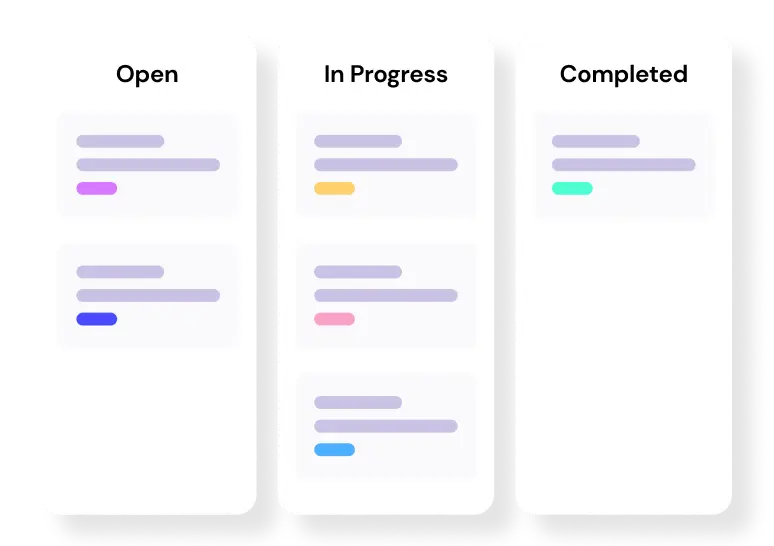
Level up your WordPress project management game with this Trello equivalent solution – where limitless possibilities come at an unbeatable price!
Problem-solving abilities
Challenges in Project Management are inevitable, so project analysts need creative problem-solving skills.
They must think quickly, consider multiple solutions, and ensure deliverables meet quality standards before recommending approaches that minimize disruptions.
Organisational skills
Managing multiple projects gets messy fast without proper structure and a clear understanding of how to organize a project.
Here, project analysts bring order by structuring work and understanding company processes, and this depends on team collaboration skills, such as:
- Managing project deadlines across departments
- Tracking budget changes and vendor costs
- Keeping teams and stakeholders updated
- Understanding company processes and changes
- Connecting projects to business goals
- Coordinating with external partners

FluentRoadmap Comes Free with FluentBoards Pro!
Educational qualifications
To step into a project analyst role, a strong educational background is usually expected.
Employers often look for a bachelor’s degree in business, computer science, finance, or a related field, as it provides analysts with the fundamentals needed to understand complex projects.
On top of that, professional certifications like PMP, CAPM, or CMC in project management bring extra credibility.
In fact, they show not just theoretical knowledge but also a commitment to applying best practices in real project environments, which helps analysts perform with confidence.
Pro Tip: In addition to the core set, risk management gives analysts added strength. Knowing how to work with risk registers, early assessments, and mitigation planning helps spot issues early and prevent costly setbacks.
Why Project Analysts Are Important in Project Management?
Every organization faces the risk of project failure. This is why organizations need project analysts to protect their resources and ensure successful outcomes.
According to PMI, 11.4% of investment is lost on average due to poor project performance
Here’s how they drive project success:
- Project analysts provide accurate data so teams know exactly where progress stands and what needs attention right away
- They set achievable budgets, timelines, and standards, reducing the risk of overruns and missed deadlines
- Identifying risks early means analysts can prepare backup plans and prevent costly surprises later in the process
- Proper analysis ensures the right resources, tools, and information are available when the project needs them most
- Clear reporting keeps everyone aligned before execution begins, improving collaboration and minimizing confusion
- They identify workflow inefficiencies and cost-saving opportunities that reduce waste and improve project execution
- When tracking deliverables against performance metrics, analysts ensure quality assurance so projects meet expected standards
How Project Analysts Work to Ensure Project Success
Let’s see how project analysts work with teams while managing their key responsibilities:
Project planning documentation
One of the analyst’s first responsibilities is documenting project plans in a central space for easy access and alignment.
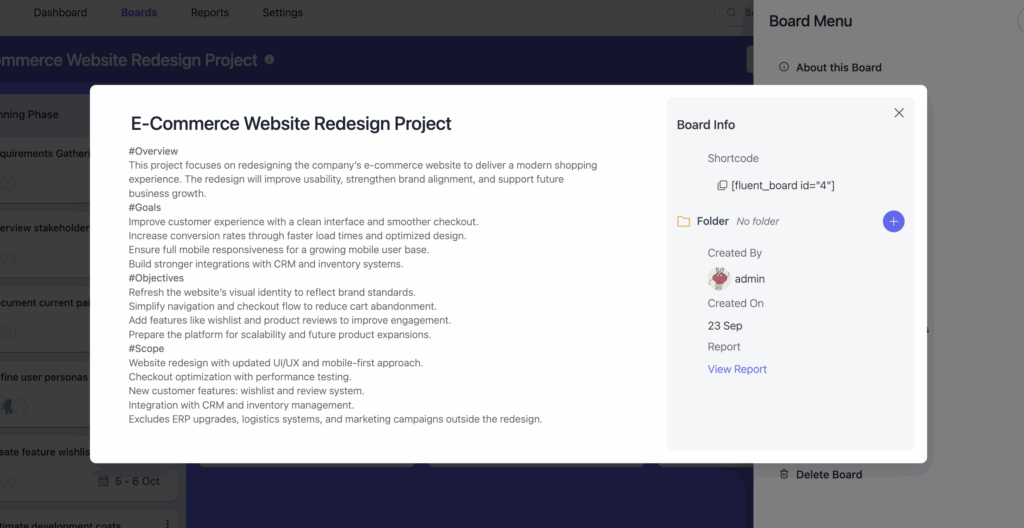
With structured documentation, they create detailed project overviews that include goals, objectives, and scope definitions.
By documenting everything in one board, analysts give teams and stakeholders a single reference point that keeps goals aligned and any changes to scope or priorities stay visible from the start.
Multiple project views for better analysis
Project analysts spend their days jumping between different analysis tasks. So when they’re checking project health one minute and tracking team workloads the next, they need different ways to see the same data.
That’s where multiple views come in handy with-
- List view
- Kanban view
- Calendar view
- Table view
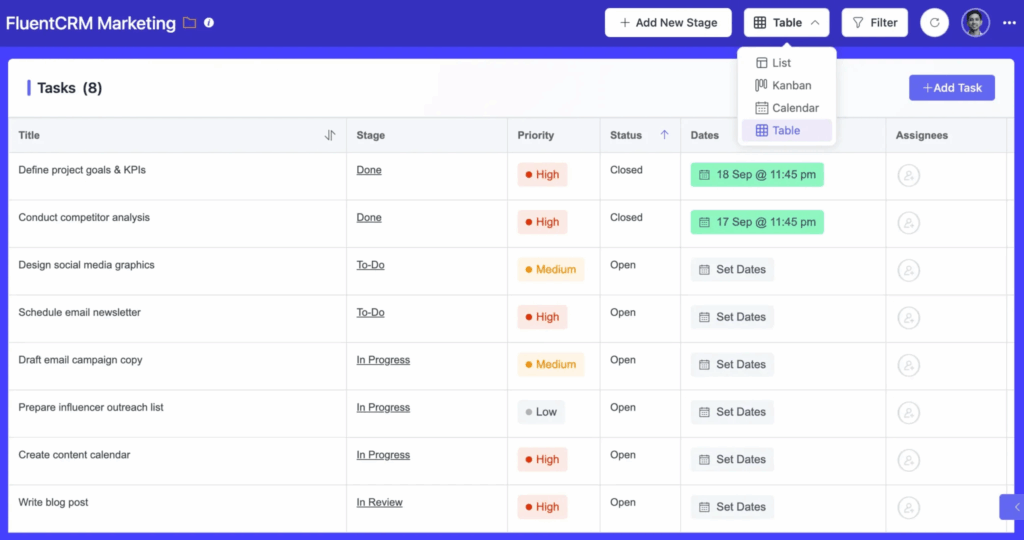
Table view, in particular, is perfect for when analysts need to scan across multiple projects quickly.
Like, if you’re trying to spot bottlenecks or figure out who’s overloaded, you can see those patterns immediately instead of clicking through dozens of individual tasks.
Plus, it makes preparing those status reports way faster since everything’s right there in front of you.
Real-time reporting for data-driven decisions
Project analysts spend most of their time analyzing data to track how projects are performing and to share clear updates with different audiences.
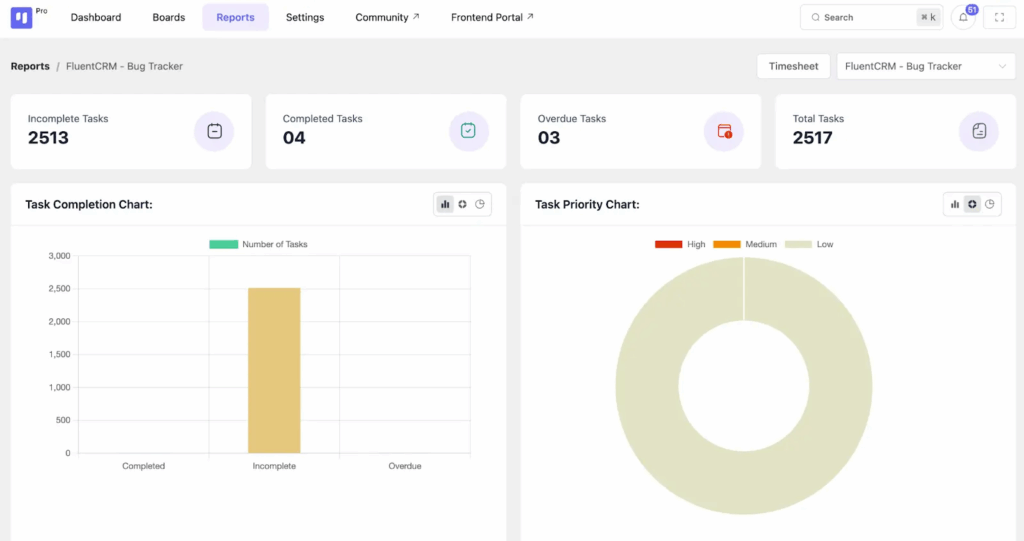
That’s where automated reporting becomes essential. Instead of spending hours building charts manually, analysts get instant dashboards showing task progress, priority levels, and completion rates that update automatically.
Here’s why this really matters: Analysts have clear visuals ready to share with stakeholders so updates are quick and they can focus on spotting issues and recommending solutions.
Time tracking for resource management
Your project analyst constantly monitors schedules and resource allocation, so they need clear visibility into actual time spent versus estimates.
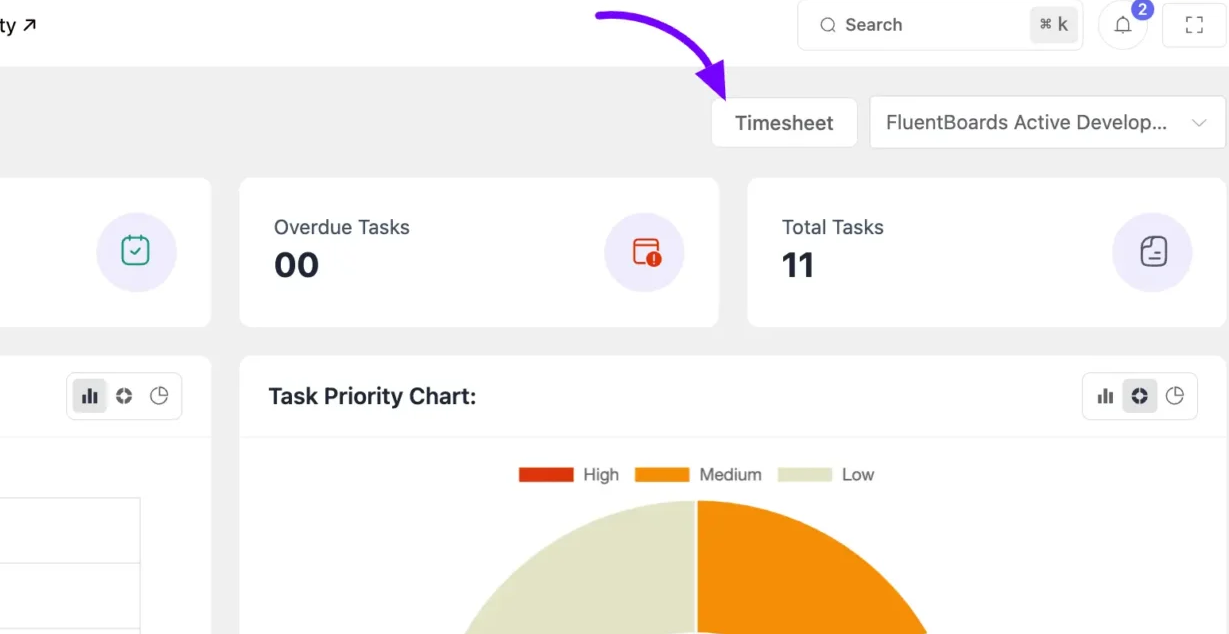
Timesheets help analysts see which tasks are taking longer than expected and identify team members who need support.
This way, they can redistribute resources early, preventing delays from becoming bottlenecks.

Also, when stakeholders request updates, analysts have concrete data showing where time is invested across projects.
Managing stakeholder involvement
Project analysts serve as communication bridges between project teams and stakeholders.
They need to know exactly which stakeholders require updates on specific work areas and when their input becomes critical for project decisions.

When tasks need executive approval or client feedback, analysts can add CRM contacts directly to relevant tasks.
This ensures analysts reach the right decision-makers immediately when delays occur or approvals are needed.
The Bottom Line on Project Analysts
A project analyst is more than just another role on the team; they are the operational bridge connecting strategy and execution.
By tracking performance, managing risks, and keeping stakeholders aligned, their work ensures every decision is based on clarity, not guesswork.
The takeaway is simple: if you want projects delivered on time, within budget, and at the quality your business demands, you cannot overlook the value of project analysts.
Thank you for reading, and let analytics-driven clarity continue to anchor your projects to their goals.
Frequently Asked Questions
Got more questions about project analysts? Let’s clear them up.
Let’s redefine project management with FluentBoards!
Get Tips, Tricks, & Updates
We won’t send you spam.














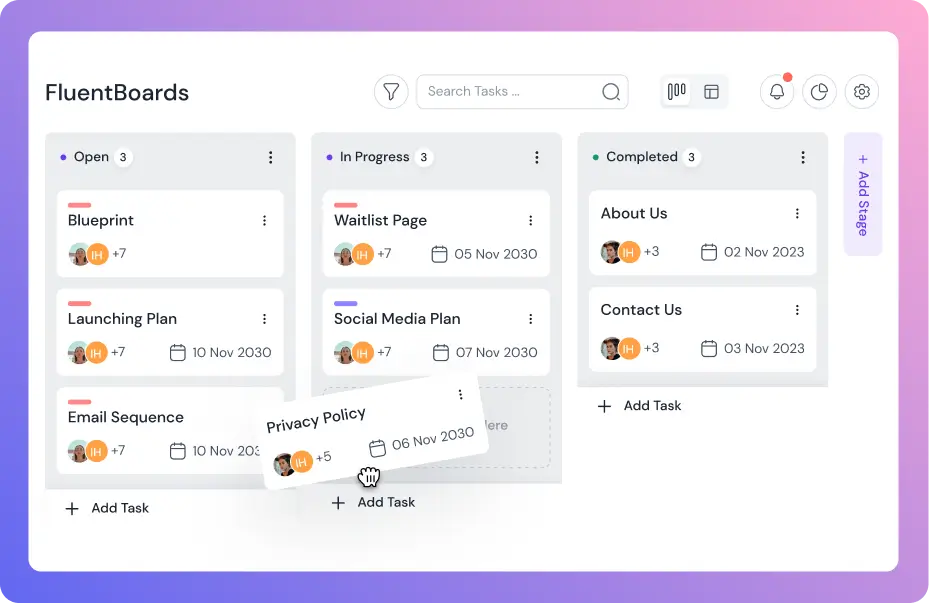
Leave a Reply